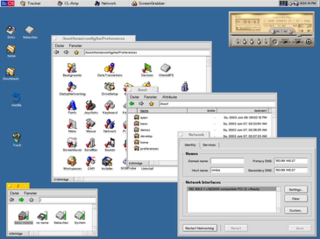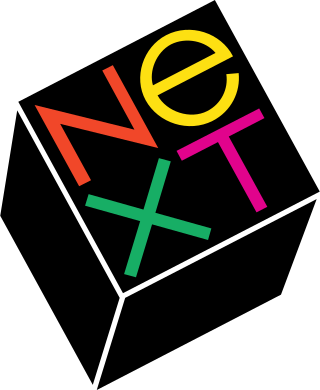Related Research Articles

Apple Inc. is an American multinational corporation and technology company headquartered in Cupertino, California, in Silicon Valley. It is best known for its consumer electronics, software, and services. Apple's product lineup includes the iPhone, iPad, Mac, Apple Watch, Vision Pro, and Apple TV; as well as software like iOS, iPadOS, macOS, watchOS, tvOS, and visionOS; and services like Apple Card, Apple Pay, iCloud, Apple Music, and Apple TV+.

BeOS is a discontinued operating system for personal computers that was developed by Be Inc. It was conceived for the company's BeBox personal computer which was released in 1995. BeOS was designed for multitasking, multithreading, and a graphical user interface. The OS was later sold to OEMs, retail, and directly to users; its last version was released as freeware.

NeXT, Inc. was an American technology company headquartered in Redwood City, California that specialized in computer workstations for higher education and business markets, and later developed web software. It was founded in 1985 by CEO Steve Jobs, the Apple Computer co-founder who had been forcibly removed from Apple that year. NeXT debuted with the NeXT Computer in 1988, and released the NeXTcube and smaller NeXTstation in 1990. The series had relatively limited sales, with only about 50,000 total units shipped. Nevertheless, the object-oriented programming and graphical user interface were highly influential trendsetters of computer innovation.

Novell, Inc. was an American software and services company headquartered in Provo, Utah, that existed from 1980 until 2014. Its most significant product was the multi-platform network operating system known as Novell NetWare.

Be Inc. was an American computer company that created and developed the BeOS and BeIA operating systems, and the BeBox personal computer. It was founded in 1990 by former Apple Computer executive Jean-Louis Gassée, who also served as the company's CEO, and was based in Menlo Park, California.

Tekserve was an American consumer electronics and information technology consulting business based in the Flatiron District of Manhattan, New York City. Founded in 1987 as a side business by Macintosh-using engineers designing computer-controlled institutional electronics, Tekserve grew from a small back-office Macintosh repair shop to become the largest single-location Apple Specialist and Premium Service Provider in the United States.

Apple Inc., originally Apple Computer, Inc., is a multinational corporation that creates and markets consumer electronics and attendant computer software, and is a digital distributor of media content. Apple's core product lines are the iPhone smartphone, iPad tablet computer, and the Mac personal computer. The company offers its products online and has a chain of retail stores known as Apple Stores. Founders Steve Jobs, Steve Wozniak, and Ronald Wayne created Apple Computer Co. on April 1, 1976, to market Wozniak's Apple I desktop computer, and Jobs and Wozniak incorporated the company on January 3, 1977, in Cupertino, California.

The Lane Cove Tunnel is a 3.6-kilometre (2.2 mi) twin-tunnel tollway in Sydney, New South Wales that is part of the Sydney Orbital Network. Owned by toll road operator Transurban, It connects the M2 Motorway at North Ryde with the Gore Hill Freeway at Artarmon and forms part of Sydney's M2 route, with the M2 Hills Motorway constituting the rest of the M2 route.
The multinational technology corporation Apple Inc. has been a participant in various legal proceedings and claims since it began operation and, like its competitors and peers, engages in litigation in its normal course of business for a variety of reasons. In particular, Apple is known for and promotes itself as actively and aggressively enforcing its intellectual property interests. From the 1980s to the present, Apple has been plaintiff or defendant in civil actions in the United States and other countries. Some of these actions have determined significant case law for the information technology industry and many have captured the attention of the public and media. Apple's litigation generally involves intellectual property disputes, but the company has also been a party in lawsuits that include antitrust claims, consumer actions, commercial unfair trade practice suits, defamation claims, and corporate espionage, among other matters.

Pappas Telecasting Companies was a diversely organized broadcasting company headquartered in Visalia, California, United States. Founded in 1971, it was one of the largest privately held broadcasting companies in the country, with its stations reaching over 15% of all U.S. households and over 32% of Hispanic households. Apart from owning and/or operating many television stations, the company formerly had two radio stations in its possession, KTRB and KMPH —changed from KPMP in June 2006 to reflect its nearby sister/flagship television station, Fox affiliate KMPH-TV, both in Fresno, California.

Coles Group Limited is an Australian public company operating several retail chains. Its chief operations are primarily concerned with the sale of food and groceries through its flagship supermarket chain Coles Supermarkets, and the sale of liquor through its Coles Liquor outlets. Since its foundation in Collingwood, Victoria in 1914, Coles has grown to become the second-largest retailer in Australia after its principal rival, Woolworths, in terms of revenue.
IndyMac, a contraction of Independent National Mortgage Corporation, was an American bank based in California that failed in 2008 and was seized by the United States Federal Deposit Insurance Corporation (FDIC).
ComputerWare: The MacSource was a chain of ten Macintosh-only retail stores in the greater San Francisco Bay Area of Northern California founded by Karim Khashoggi and Drew Munster. At one time, they were the largest Macintosh-only reseller in the United States. Guy Kawasaki mentions ComputerWare a number of times in his book, The Macintosh Way. Besides the ten stores, ComputerWare also had a headquarters that held international, direct, and corporate sales departments, and at one time had a full hardware repair depot and various training centers on the Bay Area.

Psystar Corporation was a company based in Miami, Florida, owned by Rudy and Robert Pedraza who sold "Open Computers" though one article claimed "Psystar, run by HyperMegaNet, based in Wolfsburg, Germany, currently ships to 23 destinations including the UK via delivery firm DHL."
Microsoft has been involved in numerous high-profile legal matters that involved litigation over the history of the company, including cases against the United States, the European Union, and competitors.
Mandriva S.A. was a public software company specializing in Linux and open-source software. Its corporate headquarters was in Paris, and it had development centers in Metz, France and Curitiba, Brazil. Mandriva, S.A. was the developer and maintainer of a Linux distribution called Mandriva Linux, as well as various enterprise software products. Mandriva was a founding member of the Desktop Linux Consortium.
Haddock Corporation is an American consumer electronics and information technology consulting business based in Wichita, Kansas, which operated four Haddock Computer Center retail locations in Kansas, Oklahoma, and Iowa. Founded as a software company, Haddock has been an Apple-authorized dealer and computer repair shop since 1984, the year the Macintosh computer was released. Company founder and CEO Richard Haddock served on Apple's reseller advisory board for over ten years. He is a member and one of the founders of the Apple Specialist Marketing Corporation.
Welltree Station is a pastoral lease that operates as a cattle station in Northern Territory.

Dayna Communications, Inc., was a privately held American computer company, active from 1984 to 1997 and based in Salt Lake City, Utah. It primarily manufactured networking products for Apple Computer's computing platforms, including the Macintosh, PowerBook and Newton. In 1997, the company was acquired by Intel for nearly $14 million.
References
- ↑ Cullen, Drew (2001-04-03). "Apple's Australia's top dealer goes pear-shaped". The Register . Retrieved 2008-09-24.
- ↑ West, Michael (2005-09-13). "Buzzle puts bite on Apple". The Australian . Retrieved 2008-09-24.
- ↑ "Buzzle puts bite on Apple". The Mac Observer. 2003-08-13. Retrieved 2008-09-24.
- ↑ "Going Public". Australian Broadcasting Corporation. Archived from the original on 2009-05-11. Retrieved 2008-09-27.
https://www.techmaniac.online/2020/09/epic-games-asks-court-to-prevent-what.html